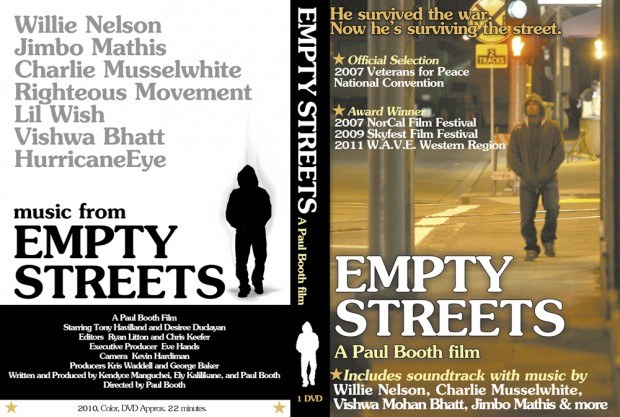LIHU‘E — An aching heart, a despondent best friend and a long trip to Vancouver created the perfect emotional vortex for filmmaker Paul Booth to pen his short film “Empty Streets,” now available in Hawai‘i public libraries. “It’s so personal.
LIHU‘E — An aching heart, a despondent best friend and a long trip to Vancouver created the perfect emotional vortex for filmmaker Paul Booth to pen his short film “Empty Streets,” now available in Hawai‘i public libraries.
“It’s so personal. As I watched the film, I could barely sit through it,” Booth said. “I feel it almost exposed too much.”
Booth, who is familiar to The Garden Island readers for his column “Hollywood to Hawai‘i,” began writing “Empty Streets” as a way for his friend, a military veteran, to be heard.
“I felt he wasn’t listened to by the (U.S. Department of Veterans Affairs),” Booth said. “I thought maybe a film could be listened to.”
“Empty Streets” was co-written and co-produced by Booth’s friend, Ely Kalilikane, a Marine Corps veteran who served from 1996 to 2002 and currently lives on O‘ahu.
The 20-minute film is based on Kalilikane’s real struggle transitioning back into society after military service.
“My focus of the film is for veterans of all wars,” Kalilikane said. “I was an intelligence specialist for the Marine Corps. … I don’t really talk about it and really, I can’t. When I came home, I wasn’t completely there. I had a lot of stuff happen in this part of my life. I was homeless for about a year, and as I was coming back to average, normal living, I wanted to share my experiences with other people.”
The film centers around a young veteran, Johnny (Anthony Haviland), whose struggles with post-traumatic stress disorder and substance abuse have left him homeless and wandering a suburban town’s empty streets at night.
A chance meeting with a prostitute (played by Kaua‘i resident Desiree Duclayan-Parsonson) helps Johnny find temporary solace.
“This film was made by people of Hawai‘i,” Kalilikane said. “We did this out of love for those who really needed their story shared and to provide a voice for those who right now, or any time in their lives, couldn’t speak out in regards to what they needed help with.”
With a script in place and a $4,000 budget, the cast and crew of “Empty Streets” converged in California to begin filming.
“But there’s no location given in the movie,” Booth said. “We wanted to show that this is happening to veterans everywhere.”
The filming wrapped in a week, and it took another year and a half to edit it. Due to work and travel responsibilities, the film was put on hold for three years until one day Booth decided to submit it to film festivals.
“We just thought we would submit the film to try and jumpstart it,” Booth said.
To the crew’s surprise, “Empty Streets” was honored with the W.A.V.E. Award (Web Audio Visual Excellence), along with winning at the NorCal FilmFest and SkyFest Film and Script Festival.
“It’s fantastic the way it’s grown,” Kalilikane said. “I don’t think us pushing it helped get it this far. The message itself, that’s what’s keeping it alive. It’s not a message about veterans. It’s a message about people who have a hard time, who can’t get out of their hard situation, whether it’s homelessness or substance abuse. It’s a multi-platform message.”
The film has been shown at veteran organizations and screened by public access stations across the country.
“We are in uncharted territory,” Booth said. “Overall, short films don’t do this well. With a short, you assume it will play a few festivals, be in the paper once or twice, and a year later be done.”
The film hasn’t played without controversy. Viewers have criticized the film for being anti-military and exaggerating the effects of post-traumatic stress disorder.
“None of us are anti-anything,” Booth said. “The bottom line is if a guy goes out to fight a war and comes back, he shouldn’t have to worry about rent.”
For veterans who have a hard time assimilating into society, Kalilikane urges them to keep moving forward.
“A lot of us are fighters by nature,” Kalilikane said. “Instead of fighting with yourself, fight for something greater.”
For Kalilikane, it was for the love of his oldest son.
“I looked at him, and I didn’t want him to follow in my footsteps,” Kalilikane said.
For Booth, the film also proves that the connections he made at Kaua‘i Community College continue to positively influence his work and life.
“People think, ‘I have to live in New York to have a voice,’ or ‘I have to be Brad Pitt to have a voice,’” Booth said. “I can pinpoint certain people at KCC who have helped me. I would not be doing what I’m doing without them.”
The soundtrack showcases a diverse mix of musicians, including a track from country star Willie Nelson.
“Empty Streets” is now available at 21 libraries across the state. Copies of the DVD are available for sale, and 50 percent of the proceeds will be donated to various charities, including the Southern Poverty Law Center, an organization close to musician Charlie Musselwhite, whose music is featured on the soundtrack.
To learn more about “Empty Streets,” visit emptystreetsmovie.blogspot.com.
• Andrea Frainier, lifestyle writer, can be reached at 245-3681, ext. 257 or afrainier@ thegardenisland.com.


